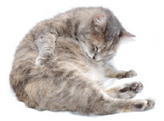Eosinophilic Granuloma

Eosinophilic granuloma ...although cats are meticulous groomers, they can still get a number of skin diseases. While some disorders and their root causes are pretty straightforward, some others can be elusive...such as bacterial or fungal infections. In eosinophilic ...an inflammatory skin disorder...a stimulus (often an allergen such as flea saliva, a food ingredient, or an environmental substance) signals the cat's immune system to send its cellular fighting force to a particular patch of skin, which results in inflammation.
Occasionally, the immune system calls off its fighters, and the inflammation subsides on its own. But if the fighting continues you will have to have your vet investigate.
Two other inflammatory skin diseases are often lumped together with this granuloma. Collectively they are called eosinophilic granuloma complex. Eosinophilic plaque ...a disease veterinarians suspect is an allergic reaction to flea saliva...causes lesions on the cat's abdomen and thighs.
These lesions tend to appear as glistening, extremely itchy patches. Indolent ulcer (also known as rodent ulcer), an ulcerated lesion, most often appearing on the cat's upper lip or beside its upper canine tooth...doesn't seem to be itchy or painful. Sometimes indolent ulcers develop in response to an allergen, but they can also be idiopathic (no known cause).
Eosinophilic granuloma derives its name from the eosinophils (a type of white blood cell) that typically infiltrate the inflamed area, causing tissue damage that results in a raised sore (granuloma). Since it causes skin lesions that have a characteristic appearance, vets can sometimes make a preliminary diagnosis by visual examination alone. In one form of this granuloma, the inflammation appears as a cord-like band of raised, hairless lesions on the middle or back of the cat's thigh.
In another form, the inflammation appears as a swelling on the cat's chin (feline chin edema) or a lump that causes the cat's lower lip to stick out. Occasionally, the disease is a reaction to mosquito bites and manifests as lesions on the bridge of the cat's nose or on its ears at the site of a mosquito bite.
But in cases where visual examination alone isn't enough, the vet will want to perform a variety of diagnostic tests. The vet may scrape off a few cells of the inflamed tissue and analyze them for evidence of parasites.
They may also culture the lesion to determine if there's a bacteria for fungal infection....and to rule out other types of inflammatory skin diseases the vet may analyze tissue taken from impression smears (cells obtained by pressing against an ulcerated lesion), needle aspirates (cells withdrawn from the lesion), or biopsy (cells obtained by removing types of inflammatory cells involved).
Eosinophilic granuloma lesions that appear on the cat's thigh or chin are more typical of younger cats and, fortunately, often go away on their own. If the lesions aren't bothering your cat, some vets simply suggest not to treat them and may perform a cursory check for causes you may have overlooked, then instruct you to watch your cat for changes in the lesions.
But if the lesions are itchy, your vet may want to stop the inflammatory process and relieve the itching. Most cats can be weaned of the medication as the signs subside. If the inflammation returns, however, your vet will likely begin a thorough search for the culprit because in cases that are recurrent or persistent, it's important to find the underlying causal factor.
Your veterinarian will likely begin the search for a causal factor by first ruling out fleas, then trying to identify less obvious allergens. If your vet can identify the allergen, the disease may be able to be treated by preventing contact with the allergen.
If avoidance isn't possible, allergy shots may work. But even if your vet can't identify a cause, he or she can still most likely control the disease with cortisone therapy.
Related Articles......
Return from Eosinophilic Granuloma to Cat Health Homepage
Having trouble finding what you need? Cat Health Index & Site Map
OR
Do you have a question to ask?...Questions
OR
Do you have a cat story to share?...Simply click here to go to that page!
Copyright@2010-2020 All rights reserved.Cat-health-detective.com
This website is information only. Consult a veterinarian for medical assistance

"Like Us" on Facebook
or...
"Like Us" here




















